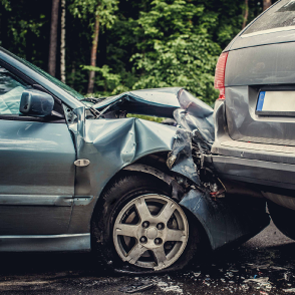How Do Car Accident Insurance Claims Work?

Sarah John's
Legal Writer
Car crashes are stressful, and the forms and phone calls can feel overwhelming. This guide keeps Car Accident Claims simple so you know what to do before, during, and after you speak to your insurer.
In Scotland, your first job after an accident is to make sure everyone is safe. Call 999 if anyone is hurt or the road is blocked, and contact Police Scotland for advice if you are unsure.
Once it is safe, swap names, phone numbers, and addresses with the other driver, and note their registration. Write down what happened, take clear photos, and check the damage to every part of your car.
These first steps set you up for a smoother car accident insurance claim. We will go over how to start the claim, what evidence is most helpful, and how insurance companies usually handle the process.
Table of Contents

Get In Touch With Your Local Office:
With local knowledge and a national network of experts, we have the experience you can count on.
Initiating The Insurance Claim Process
1. Gathering Necessary Documentation And Information
Strong evidence makes the car insurance claim process go much more smoothly. Begin with clear photographs of each panel, light, mirror, and any interior damage (e.g., airbags, trim). Take both wide-angle and close-up shots to highlight the damage.
Write down the date, time, and precise location in Scotland. Take note of the weather, road layout, and any obstacles and dangers. If Police Scotland arrives, ask for the accident number.
Swap information with the other driver. Keep a record of names, addresses, phone numbers, and registration numbers.
Obtain witness statements from bystanders. Get their contact information and a brief description of what they saw and heard. These accounts can help if the fault is disputed.
Keep every document linked to the crash while making a car insurance claim. Save photos, notes, witness statements, police reports, repair estimates, invoices, and emails from your insurer. Store copies in one folder so you can send them quickly if asked.
If you think the other driver is an uninsured driver, write down their make, model, and registration. Tell your insurer about this right away. The record you keep can help them guide you through the next steps.
2. Reporting The Accident To The Insurance Company
If you are involved in an accident, contact your insurer as soon as you can, ideally within 24 hours. Even if a few details are missing, contact your insurance and give the basics so the claim is logged. If Police Scotland arrived, ask them for the accident number.
Prepare your policy number, registration, and the date, time, and location of the crash. Share the other driver’s name and registration number, as well as a brief, factual account of the accident. Make sure your notes are clear to avoid guessing.
Your insurer will open a claim and explain the next steps. They may arrange recovery, repairs, or a courtesy car, depending on your cover and type of insurance. Comprehensive policies move quickly, whereas third-party coverage can take longer if the other party disputes fault.
Stick to the facts and avoid admitting fault. Ask about the excess, no-claims discount, and any additional documents they will require. Quick reporting helps you avoid time limits that some policies set.
Keep your claim reference safe and track updates. Save emails and letters so you can respond quickly when asked. These early steps set up a smoother car insurance claims process.
3. Evaluation Of The Claim By Insurance Adjusters
Once your claim is logged, an adjuster reviews the file and checks the facts. They examine photos, notes, police reports, and any witness statements. Their aim is to confirm what happened and who was responsible in car collision insurance claims.
If the fault is disputed, they compare both versions of the story and may request more evidence. They can also check repair estimates or send you to an approved repairer. Clear records help them reach a fair decision.
When the adjuster determines who was at fault, they look into what your policy covers. They will explain whether your insurer will pay for repairs, provide a rental car, or make a cash settlement. If the damage is too serious to fix, they calculate the value of your car before the accident and base the payout on that value.
The outcome guides what the insurer will cover the costs for. Keep in touch, answer questions quickly, and save every update. This allows the process to move forward without delay.
4. Determining Fault and Liability
When it comes to determining fault, many drivers ask how do car insurance claims work. Insurers compare each driver’s statement to photos, dashcam videos, CCTV footage, and witness statements. If the facts do not match, they may divide liability by percentage or determine that one party is solely to blame.
Police Scotland information and an accident number can help confirm the timeline. Strong evidence helps to speed up the decision-making process and reduce disputes. If the other driver admits fault, the process is usually faster.
The outcome determines who pays for repairs and whether you are able to recover the excess. If you are injured, you may be entitled to compensation through Personal Injury Claims in Scotland. Keep medical records and receipts as proof of treatment costs and lost income.
5. Estimating Damages And Repair Costs
Your insurer will assess the damage after a car insurance claim after accident and may require you to visit an approved repairer. The garage inspects the car, lists parts and repair work, and sends an estimate. Clear photos and your notes help the assessor check the figures.
You can ask for more than one estimate if you want peace of mind. Repairs may take longer if parts are hard to find or if hidden issues appear once work starts. Keep all invoices and emails so that costs can be easily tracked.
If the car is beyond economic repair (costs more to repair than its actual value), the insurer may declare it a write-off. They will appraise the car at market value and explain the payment options. The process is typically quicker with comprehensive cover as the insurer can arrange repairs or settlement directly.
6. Coverage Limitations And Deductibles
Your cover depends on your policy and its limits. Comprehensive policies usually cover your own damage, while TPFT and third-party policies focus on others. Knowing the types of car insurance claims helps you see what is included before you start.
Most policies have an excess that you pay toward the cost of repairs. There is usually a compulsory part set by the insurer, and a voluntary part you choose to keep your insurance premium lower. If you are not at fault and your insurer recovers all costs, your excess may be refunded (but it’s not guaranteed).
Check for limits and exclusions in your documents. Some claims fail if policy terms were broken, or if you wait too long to report the crash.
If you want to make a claim for damage to your own car, you usually need comprehensive cover, as this type of policy is the only one that pays for claiming on car insurance for accidental damage in Scotland.
7. Settling The Claim: Negotiation And Agreement
After the evidence is checked, your insurer reviews repair estimates and confirms what the policy covers. They discuss the outcome with you and explain whether repairs, a courtesy car, or a cash payment are required. Keep receipts and emails so that any payments can be processed promptly.
Timelines vary with the complexity of the crash and any dispute about fault. You can check our guide on How Long Does A Car Insurance Claim Take To Settle UK, but every case is different. Short, factual updates and quick replies from you help move things along.
If the other side negotiates about fault, settlement may involve split liability. The car insurance claim dispute process relies on clear photos, witness statements, and police details to reach a fair result. Strong records reduce back and forth.
A claim may be denied if key documents are missing or your policy does not cover the situation. If your insurer believes you violated the terms of your policy, they may refuse to pay and explain why.
When this occurs, carefully review your paperwork, include any missing information, and request that your insurer review your case again. You can also ask for written reasons for the refusal so you know exactly what needs to be fixed.
8. Receiving Compensation: Repair Or Replacement
Once your claim is accepted, the insurer confirms the repair plan and may direct you to an approved garage. With comprehensive cover, they often arrange recovery, repairs, and a courtesy car. Keep all invoices, repair estimates, and emails in one place so your car accident insurance settlement goes through smoothly and without delays.
If the car is beyond economic repair, it may be classed as a write-off. The insurer will value the car at the market rate and pay that figure, usually minus the excess. You can ask them to review the value if you have ads or valuations that show a higher price in Scotland.
How do insurance companies pay out claims uk? Payments can go straight to the repairer or to you by cheque or bank transfer. Save receipts for travel or hire costs in case they are covered. When making an insurance claim on your car, ask about excess refunds if the other insurer accepts full fault.
9. Resolving Disputes And Seeking Legal Assistance (If Necessary)
If the other side denies fault, keep calm and stick to the facts. Share photos, contact details, police references, and witness statements so your insurer can review the case again.
Ask for written reasons if a decision goes against you. Add any missing records and request an internal review. You can also use the insurer’s formal complaints route if needed.
A dispute can affect your no claim discount at renewal if liability is split or placed on you. Ask your insurer to confirm how this will be recorded and whether your no-claim discount can be protected. Keep notes of every call and email.
If the injuries or financial losses are significant, legal advice can assist. Check your policy for legal coverage, or seek advice from our panel of No Win No Fee Solicitors in Scotland.
How Do Total Loss Car Insurance Claims Work?
A total loss or write-off indicates that the cost of repairs exceeds the value of the vehicle. The insurer values the car at its market price on the day of the accident and pays that amount, after deducting the excess. In a car insurance claim process not at fault, your excess can be refunded if your insurer recovers all costs from the other party’s insurer.
The insurer will usually take the car once the claim is settled. You can ask to keep it by buying the salvage, and the salvage value is then taken off the payout. They must get your consent before scrapping or breaking the vehicle.
If the offer seems low, gather adverts for similar cars in Scotland or pay for an engineer’s report. If the car was new or on finance, consider GAP insurance to cover any shortfall. Ask about a courtesy car and what happens to any personal items.
What If You Have Comprehensive Insurance?
Comprehensive coverage protects both your own vehicle and other people’s property. After an accident, your insurer can arrange for recovery, approved repairs, and, in many cases, a courtesy car. In Scotland, this typically speeds up and simplifies the process.
You are still responsible for the policy excess, but it may be refunded if the other driver is found to be at fault and your insurer recovers all costs. Some policies include uninsured driver benefits, which can help protect your no-claims bonus if the other driver is not insured. Always keep your photos, repair estimates, and emails in one place.
If you are looking for information on how to claim car accident insurance, have your policy number, accident details, and any police references with you. As soon as possible, report the accident. Request confirmation from your insurer about what is covered and what documents are required next.
What If You Have Third-Party Insurance?
Third-party insurance pays for damage or injury you cause to others, not your own vehicle. If you are hit and not at fault, the other driver’s insurer should handle your repairs. The process can take longer if the fault is disputed.
Report the crash to your insurer so that it is documented. Keep photos, repair estimates, and witness statements ready for the other side. Ask for updates in writing so you can track progress.
If the at-fault driver is uninsured, you may claim through the Motor Insurers’ Bureau. Your own policy will not usually repair your car in this case.
What If The Accident Wasn’t Your Fault?
Report the accident to your insurer as soon as possible and provide a detailed account. Include any Police Scotland accident numbers as well as witness contact details. With comprehensive coverage, your insurer can arrange repairs and then pursue the other party for compensation, and your excess may be refunded if they recover everything.
When you only have third-party coverage, you usually make a claim with the other driver’s insurer, which can take longer if blame is disputed. Keep photos, receipts, and repair estimates to help you recover damages. If you make a full recovery, your no-claims bonus should remain intact, but premiums may increase at renewal.
What If The Driver Is Uninsured Or Can’t Be Identified?
If you have comprehensive cover, tell your insurer and start a claim. If you have third-party or TPFT, you may claim through the Motor Insurers’ Bureau in Scotland. Give them as much detail as you can.
Write down the other vehicle’s make, model, colour, and car registrations numbers if known. Save photos, witness contacts, and the time and place. If Police Scotland is present at the scene, keep any accident or reference numbers.
Some policies include uninsured driver benefits, which protect your no-claims status if fault is proven. Ask your insurer what proof they require and whether your excess can be refunded later. Keeping meticulous records makes the process run more smoothly.
Insurance Claims And Minor Damage In Older Cars
With older cars, even minor damage can cost more to fix than the market value of the car. Insurers may treat it as a write-off if repairs exceed the market value. Knowing how car insurance claims work helps you weigh up the options before you start.
Get one or two repair estimates and compare them with your excess. If the repair cost is close to or below the excess, you might choose to pay yourself to avoid a claim on record.
Can Car Insurance Be Transferred?
In Scotland, a car insurance policy is tied to the named driver and the vehicle. When you sell a car, you cannot transfer your insurance policy to the new owner. Before driving the vehicle on public roads, the buyer must arrange for their own coverage.
You can usually transfer your policy to a different vehicle by contacting your insurer. The price, excess, and terms may change after they evaluate the new vehicle. Your no-claims bonus remains with you rather than the car, and cancellation fees may apply if you cancel the policy.
Can Car Insurance Be In Someone Else’s Name?
Yes, but there are limits. The policyholder must have a real financial interest in the car, such as being the owner or registered keeper, or be clearly linked to it. The main driver must be declared correctly.
Putting a parent or friend as policyholder while a younger driver is the main user is risky. This is called fronting, and insurers can cancel the policy or refuse a claim. Any no-claims bonus stays with the policyholder.
How Much Will My Car Insurance Increase After A Claim?
Premiums often rise after any claim in Scotland, even if you were not at fault. Insurers see drivers who have had an accident as a higher risk for a time. The increase is usually greater after a fault or split liability claim.
Your no-claims bonus may drop unless it is protected. If your insurer recovers all costs from the other side, your bonus should stay intact. Always ask your insurer how the claim will be recorded.
DEDICATED CLAIMS ADVISORS
Our dedicated claims advisors are always available to offer free legal advice.
100% NO WIN NO FEE CLAIMS
All our claims are processed on a No Win No Fee basis; you pay nothing if you lose.

MILLIONS SECURED IN DAMAGES
To date, we have secured millions in damages.
THOUSANDS OF SATISFIED CLIENTS
To date, we have helped thousands of clients recover compensation and continue to do so.
How Long Does A Car Accident Claim Take To Settle?
There is no set time for settling a car accident claim in Scotland. Simple cases with clear evidence and no disputes can be sorted within a few weeks. Claims involving several vehicles, injuries, or disagreements about who was at fault can take much longer.
Comprehensive coverage often makes things go faster because your insurance company can approve repairs and then pay for them later. If you want to avoid delays, have all your papers, pictures, and receipts ready, and answer your insurance company’s questions right away.
How Car Insurance Is Calculated?
Insurers look at your policy type, your car, and your risk profile. They weigh things like comprehensive versus third-party cover, your chosen excess, your driving record, and your recent claims. Your no-claims bonus can lower the price.
Past accidents matter. Even non-fault accidents can push premiums up for a while. If you wonder what happens if I claim on my car insurance, expect your bonus to drop unless protected, and ask your insurer how the claim will be recorded.
Which Car Insurance Group Is Cheapest?
Cars in the lower insurance groups cost the least to insure. In Scotland, groups 1 through 5 are typically the most affordable because these vehicles are small, inexpensive to repair, and have high safety ratings. They also tend to have smaller engines and lower performance, which reduces risk for insurers.
Higher groups often include larger or faster vehicles, so their insurance costs more. When comparing cars, check their group rating before purchasing to see how it may affect your premium. Choosing a lower group can save you money in the long run, especially if you make no claims and maximise your bonus.

Can’t Work Due To Illness Or Injury?
Use our free online claim check tool and find out in minutes if you have a claim.
What’s The Difference Between Non-Fault And At-Fault Car Insurance Claims?
The difference comes down to who pays in the end. In a non-fault claim, your insurer gets all its money back from the other side, while in an at-fault claim, they do not.
Non-Fault Claim:
Your insurer handles repairs and then recovers the full costs from the other driver’s insurer. Your no-claims bonus should stay intact, though premiums can still rise at renewal.
At-Fault Claim:
You or your insurer is responsible for the loss, either fully or on a split liability basis. Your no-claims bonus usually drops, and your premium is likely to increase.
Easy Ways To Get In Touch
We are here to help. Give us a call, request a call back or use our free claim check tool to get in touch with our friendly legal team. With local knowledge and a national network of experts, we have the experience you can count on.





